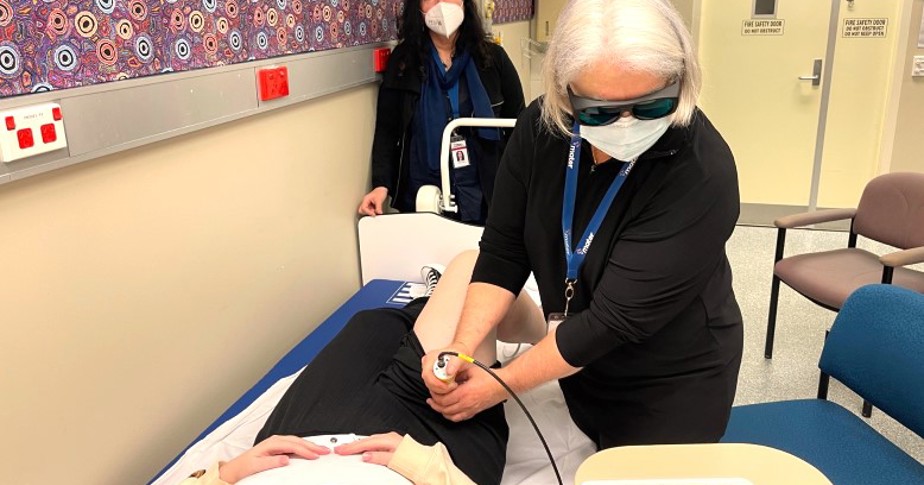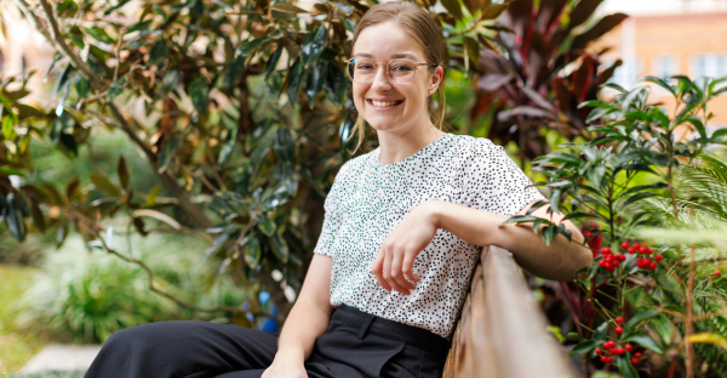
Mater Researchers are a step closer to discovering whether laser light therapy can reduce Inflammatory Bowel Disease (IBD) symptoms in young people.
Mater Research senior researchers Dr Tatjana Ewais and Associate Professor Liisa Laakso are conducting the ground-breaking trial in collaboration with Australian medical laser company, SYMBYX.
The trial will investigate whether photobiomodulation (PBM or light therapy) is effective in relieving IBD symptoms among 28 participants aged between 18 and 35 who are being treated at Mater Hospital Brisbane.
IBD is a chronic auto-inflammatory disease of the gastrointestinal tract which can cause high levels of fatigue, depression and pain. The group of diseases that fall under the IBD umbrella include Crohn’s, ulcerative colitis and indeterminate colitis.
The trial will investigate if a specific wavelength of light from the PBM device can reduce inflammation caused by IBD.
Researchers will also measure whether the infrared light can increase the diversity and number of beneficial bacteria in the gut microbiome.
Mater Young Adult Health Centre lead psychiatrist Dr Tatjana Ewais said the clinical trial was a leap in the right direction for young people experiencing the debilitating effects of IBD.
“More than 100,000 Australians are living with IBD and most of them developed the disease between the ages of 15 and 29,” Dr Ewais said.
“We believe this treatment has the potential to dramatically improve the quality of life of young people by reducing fatigue, depression, and pain associated with IBD.”
SYMBYX CEO Dr Wayne Markman said the PBM treatment was a non-invasive laser therapy that has been successfully used to treat chronic pain and inflammation as well as reduce certain other symptoms in patients with Parkinson’s Disease.
“Previous research has shown the infrared laser treatment improves mitochondrial function in all cells, boosting their capacity to fight inflammation,” Dr Markman said.
“The Therapeutic Goods Administration has recently approved PBM for treatment of inflammatory conditions and our PDCare Laser is already being used to treat more than 2,500 patients in Australia, New Zealand, the United Kingdom, Europe and other parts of the world,” he said.
“We have also conducted two clinical trials in Adelaide and Sydney which showed improvements in several motor and cognitive skills among people with Parkinson’s Disease.”
Dr Liisa Laakso said the Mater trial participants will be treated with 30 minutes of SYMBYX laser therapy every week over 10 weeks.
“We will examine more than 90 samples from participants before and after treatment to measure inflammatory marker levels, microbiome diversity and composition,” Dr Laakso said.
“Trial participants will also be asked to keep a pain diary throughout the trial and complete questionnaires about fatigue and physical activity.
“IBD is a debilitating condition, and we’re excited to begin this important research which will provide a clearer understanding of the power of infrared laser therapy to change the lives of young people affected by it.”
Jazmine Domagala, 20, was diagnosed with Crohn’s Disease when she was 13 years old and welcomed research into new treatment options for people with IBD.
“Crohn’s disease has affected my day-to-day life for so long – making me always tired or in pain,” she said.
“It’s also very isolating because I make decisions based on my disease. Unlike most other 20-year-olds I don’t go out drinking and partying late into the night because I know I will be floored the next day
“I’m hoping this trial will help reduce my fatigue and pain which in turn will help me manage my anxiety and depression. It would be great if this treatment could help me get a better quality of life.”
Trial participants have been recruited through Mater Hospital Brisbane.
The research is funded by SYMBYX and it will run until late 2023.



